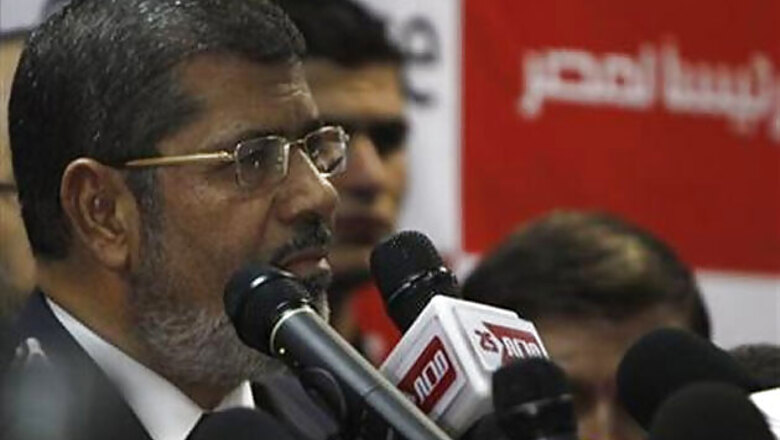
views
Cairo: Egypt's agonised passage from revolution to democracy was in limbo on Monday, as the Muslim Brotherhood claimed victory in a presidential election while the generals who took over from Hosni Mubarak decreed it was they who would keep power for now.
That drew a sharp rebuke from Washington, long the Egyptian military's financial sponsor. The Pentagon said it was "deeply concerned" and urged the army to hand over "full power" to civilians - but it made no mention of US action if it did not.
The former general running against the Brotherhood's Mohammed Morsy scorned the Islamist's self-declared triumph as a bid to "hijack" the election. Ahmed Shafik, Mubarak's last prime minister, said his data showed it was he who was ahead.
After a day of counting, and mutual jibes over violations, there was no official word on how the two-day run-off had gone and electoral supervisors warned they may not publish a result until Thursday - prolonging what for many Egyptians has become a wearisome deadlock between a military past and religious future.
Shafik's camp insisted he led by two to four points but even sources in the army, which has fought the Brotherhood through six decades of military rule, indicated they were preparing to accept that Morsy had won Egypt's first free presidential vote.
But whoever emerges as president - and one electoral official privately endorsed Morsy's claim to be leading by 52 per cent to 48 with the bulk of votes counted - he will find his powers tightly circumscribed by a decree issued by Field Marshal Hussein Tantawi's military council as polls closed on Sunday.
Having last week dissolved the parliament that was elected in January with a thumping Islamist majority, the Supreme Council of the Armed Forces (SCAF) said it would now take the assembly's legislative powers itself and could also step in to break a deadlock in drafting a new constitution.
Liberals and Islamists called it a "military coup".
"Military Transfers Power - to Military," ran the ironic headline in independent newspaper al-Masry al-Youm.
US DISCOMFORT
Tantawi, Mubarak's defence minister for 20 years, had promised Egyptians who entrusted him with their revolutionary gains to hand power to civilians by July 1. That pledge, endorsed by the United States, would be satisfied, the council said, with the induction of a new civilian president by June 30.
Yet he will be a president who can only appoint a government whose every law must be endorsed by SCAF. A timetable set down for writing a constitution, passing it by referendum and then electing a parliament could leave Tantawi in charge until 2013.
At the Pentagon, a spokesman said: "We are deeply concerned about the new amendments to the constitutional declaration, including the timing of their announcement as polls were closing ... We support the Egyptian people in their expectation that the (SCAF) will transfer full power to a democratically elected civilian government, as the SCAF previously announced.
Facing a dilemma over how far to push its leverage over a close ally, the biggest Arab army in a turbulent region where militant Islam is a common threat, Washington released $1.3 billion of annual military aid to Egypt in March despite slow progress on democracy. The Pentagon said on Monday it wanted to maintain those close ties, but would "monitor events closely".
"It is unclear who will rule, who the real leaders will be, and who - if anyone - represents the people," said Anthony Cordesman at the Center for Strategic and International Studies in Washington. "What is clear is that Egypt is no closer to stability and a predictable path to the future than before.
ISLAMIC FUTURE
The Brotherhood, however, expressed its joy and defiance on the streets and Morsy, a 60-year-old, US-educated engineer who was a political prisoner under Mubarak, promised to be a leader of all Egyptians - a nod to the many, from Christians to secular liberals to moderate Muslims, who fear intolerant clerical rule.
"Thanks be to God who has guided Egypt's people to the path of freedom and democracy, uniting Egyptians for a better future," Morsy said in a victory speech forswearing revenge.
Hundreds of flag-waving supporters of the Brotherhood gathered in Tahrir Square, where the anti-Mubarak revolt was launched on January 25, 2011, mainly by secular young urbanites.
"Thank God, we have got rid of military rule and the police state," said Mona Issam, one of several cheering women clad in robes and full-face veils. "We hope Morsy takes power from the military council ... We lived like strangers in our land under the old regime. We were oppressed and Islam was not the law."
Hosni Qutb, a 45-year-old physician, derided Shafik as the "candidate of Israel", in reference to the military rulers' 33-year-old peace treaty with Egypt's Jewish neighbour. Israel fears growing hostility from Cairo and said an Israeli and two militants were killed in an attack on its border overnight.
Yet Monday's celebrations were hardly noticed in daily rush of the capital and measured barely a drop compared to the human sea that engulfed Cairo on February 11 last year when Mubarak fell, pushed aside by generals fearful of losing their own privileges.
Morsy attracted support from many who reject his religious agenda and the imposition of Islamic law but wanted to bar the way to Shafik, 70, whom they see as the heir to the old regime.
As Islamists cheered, unemployed Mohamed Mahmoud, 28, did not share their joy: "I voted for Morsy but I can't say I'm happy," he said. "I'm still afraid of both and what they may do.
"I don't want an Islamic state or a new Mubarak state."
"This decree just makes plain the hegemony of SCAF," said Khaled Ali, a liberal lawyer eliminated in the first round of voting. "This decree strips the president of the powers he was elected to have and gives those to the military council."
The order indicated that the army, which controls swathes of Egypt's economy, has no intention of handing substantial power to its old Islamist adversary and may be hoping that public disillusion with the Brotherhood's performance will reduce its influence on the new constitution and the next parliament.
VIOLENCE IN CHECK
The Brotherhood has contested the army's power to dissolve the present parliament and, with other groups, has called for a mass demonstration on Tuesday. It has warned of "dangerous days" ahead. But few see the Islamists, who hung back at the start of the revolt and spent much of the past year in uneasy symbiosis with the army, launching a violent grab for power any time soon.
In a statement, the movement rejected SCAF's right to issue a decree but avoided direct confrontation: "SCAF must keep its word to the people to hand over executive power to an elected president," it said. In fact, it is "executive" power that the generals plan to transfer, while keeping "legislative" rights.
A Western diplomat said the Brotherhood, badly bloodied in the 1990s, would tread cannily: "What the counter-revolutionary forces would like is for the Muslim Brotherhood to throw their forces onto the street. Then there would be a real pogrom.
"That is why I don't think it will happen."
A senior Brotherhood official, Essam el-Haddad, told Reuters: "This is the beginning of a very tough path. The beginning of it is dealing with the amended constitutional declaration that strips the president of any real powers."
The failure of the new parliament to agree a consensus body to draft a constitution - liberals accuse the Islamists of packing the panel with religious zealots - has left Egyptians picking their way from revolution to democracy through a legal maze, while the generals control the map and change it at will.
Some lawmakers, now barred by the army from the parliament building, met to debate a new constitution. But many expect SCAF to soon usurp their powers and name its own drafting panel. It has also formed a new National Defence Council, to include the civilian president, but on which soldiers have a majority.
General Mohamed Assar defended the actions of his comrades on SCAF: "This big country, with its big problems, will face challenges in its move towards democracy," he said, but added:
"With the support of this great people ... the first president in the history of Egypt chosen by the people will soon begin building the new renaissance of Egypt."
However, the experience of the past year has left many Egyptians doubting that the military, and what they call the "deep state" stretching across big business, Mubarak-era judges, security officials and the army, will ever hand over control.
Political chaos has ravaged a vital tourist trade focused on pyramids and Red Sea beaches and the latest turn of events, by prolonging uncertainty, may further harm the economy. The main stock market index fell 3.4 per cent to a five-month low.
"How can you possibly make these huge economic decisions in such circumstances?" says Gabriel Sterne, an economist at London investment banking house Exotix. "Such events as these only serve to undermine confidence and accelerate capital flight."




















Comments
0 comment